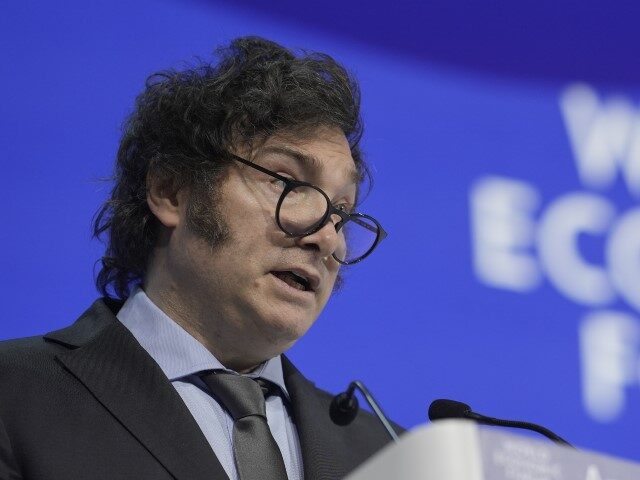The National Institute of Statistics and Census of Argentina (INDEC) announced on Tuesday that Argentina registered a 13.2 percent inflation rate in February, marking the second month in a row where inflation has slowed down as a result of President Javier Milei’s austerity policies.
Upon taking office in December, Milei applied a series of “shock therapy” measures to avoid a total economic collapse in Argentina after nearly two decades of socialist governments left the country teetering on the brink of hyperinflation. Milei began by undoing as many of the hundreds of socialist regulations as possible and has turned his attention towards the near-depleted foreign reserves and a convoluted currency control system.
The 13.2-percent inflation rate recorded in INDEC’s extensive February report is lower than the 15 percent analysts were forecasting hours before the announcement, and much lower than January’s 20.6 percent and December’s 25.5 percent.
In a Tuesday statement, the office of the Argentine presidency said that February’s inflation rate is the result of the government’s work to impose “a strong fiscal discipline.”
“On December 10, 2023, in his inauguration speech, President Javier Milei informed the Argentine people that he was receiving an inflation rate of 15,000% per year, against which he would fight ‘tooth and nail,'” a statement from the president’s office reads. “That is the commitment made and the non-negotiable objective.”
Milei, in a Wednesday morning interview with Argentina’s Radio Mitre, said February’s numbers were “a tragedy” and admitted that March will be a month with “a deeply complicated seasonal nature.”
The Argentine president nevertheless stressed that the inflation in February must be placed “in context,” as he received an economy with an assured risk of hyperinflation.
“When the Government took office, the daily inflation rate was traveling at 3,700 percent per year; during the second term it accelerated to 7,500 percent,” Milei explained. “When one takes the wholesale inflation figure of 54% in December, annualized it is 17,000 percent.
“This is the catastrophe left by Kirchnerism [socialists that ruled Argentina for 16 out of the past 20 years],” he continued. “When one finishes cleaning the monetary numbers of the last year of Kirchnerism, and hopefully it is not only because of the electoral issue of this Government that passed, they issued 13 points of the GDP against a monetary base of 2.6 percent of the GDP.”
Milei echoed Economy Minister Luis Caputo’s concerns about the rising price of food, reiterating that his government will expand approval of food imports to help reduce prices and increase market competitiveness.
“The price makers priced under a hypothesis of 2,500 [argentine] pesos per dollar. And instead of lowering prices, they started with promotions,” Milei said. “That is why prices in Argentina became expensive in dollars. We are going to open up more and more so that competition can enter.”
“The price of food is strongly dominated by what is happening with the dollar and now we are opening imports, and they are going to go down,” he continued.
Milei also said that Argentina is now much closer to lifting the foreign currency control restrictions, but stressed that he will continue his economic plans because he prefers “to avoid hyperinflation.”
“Lifting the [foreign currency restrictions] is much closer than far away. The [International Monetary] Fund’s estimates analyze that it would be possible to do it in the middle of the year,” Milei explained. “Moreover, there are economists who consider that we could do it now.”
Milei asserted that, had he lifted Argentina’s currency restrictions immediately upon taking office, there would have been a “100 percent chance” of a bank run, which is why he preferred to avoid that risk.
“The problem is that if we open nobody assures me that there won’t be a run. That is why I said that in order to open it now I need to get 15 billion dollars,” Milei said. “I am not willing to take the risk, I prefer to endure this weak situation of [economic] activity a little more but avoid hyperinflation.”
“We are committed to exterminating inflation and we are doing it. If you look at the numbers for March, despite a rebound, inflation is in the order of 7 or 8 percent,” he continued.
Christian K. Caruzo is a Venezuelan writer and documents life under socialism. You can follow him on Twitter here.

COMMENTS
Please let us know if you're having issues with commenting.